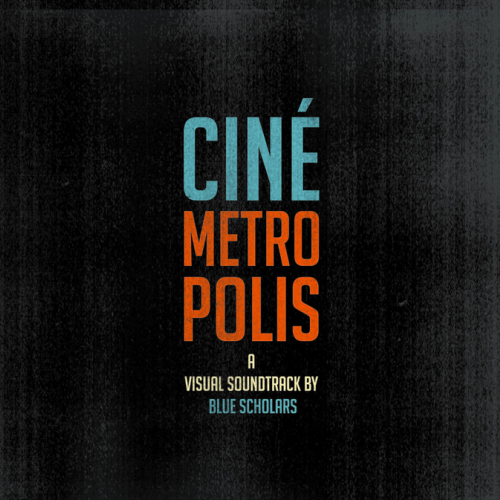
Amidst the massive amount of success Blue Scholars has experienced since its formation in 2002, MC Geo (aka. Prometheus Brown) and DJ/producer Sabzi have remained stubbornly — defiantly even — proletariat in their musical aims. It’s a testament to the duo’s acute devotion to the rank-and-file they prefer to serve that there have been no Clear Channel radio-ready singles, no flirtations with major labels and their “fucked-up” (as Geo once put it) three-sixty deals, no appearances on late night television, and no wavering from the Socialist underpinnings that have provided the ballast for the group’s lyrical content since its inception.
In fact, in support of the crew’s third LP, Cinemetropolis, Geo and Sabzi asked “the people” to subsidize the album’s production via the Kickstarter platform, a move that could have been dismissed as rap hubris run amok if it had been made by any other group without a history as communally-oriented as this one. Fans replied to the tune of about $62,000 in donations in 45 days, a response that indicates Blue Scholars has become a sort of mini-movement in addition to just being a rap group. This particular album cycle is literally being powered by a loyal fan base that asks for little in return other than the group’s best efforts at dopeness on wax, which is exactly what Cinemetropolis represents thus far in Blue Scholars’ discography.
The group was unofficially knighted the de facto leader of Seattle’s underground hip-hop movement in the mid aughts, all of it due to the crew’s self-titled debut album, an accessible collection of Golden Era-styled boom-bap with a revolutionary spirit and anti-establishment bent. The group’s sophomore LP, Bayani, featured complex layers of rhythm and dense sonic textures that were darker in comparison. It was a dynamic listen on the headphones but didn’t translate nearly as well live. The album felt a little like growing pains with respect to the group’s sound, with fewer samples at the forefront of the production and more distinct musicality that provided unique description for the group’s identity.
With Cinemetropolis, Geo and Sabzi have separated themselves musically from every hip-hop group in Seattle’s now bustling scene and arguably from most acts nationally. Sabzi’s evolution as a producer over the last year or so has seen him shed the sample-heavy boom-bap skin of the group’s prior work in favor of more colorful compositions comprised of heavy synth and deep reverberating drum and bass that often sounds tropical. Tracks like the rolling, low end-heavy “Slick Watts” and “Seijun Suzuki” fall in line with the producer’s ride-friendly work for Das Racist (“All Tan Everything” and “Who’s That Brown?”), while the beautiful, sweeping synth waves of the epic “George Jackson” is akin to the arrangements of Made In Heights, his electro-pop side project with singer Kelsey Bulkin (who also lends vocals on Cinemetropolis’ title track).
It’s impossible to determine whether Blue Scholars has officially found its particular “sound” or if this is just one paragraph in the group’s musical narrative, which seems more likely. It’s unlikely, however, that a similar lyrical concept will ever pervade future albums. Cinemetropolis was intentionally engineered as a “reverse soundtrack,” whereby each of the album’s fifteen tracks will inspire accompanying short films and/or music videos. The group is interested in how film informs our perception of real life and vice versa, a conceit that generally holds the LP’s wide spectrum of subject matter together. The idea is especially interesting when you factor in the group’s reputation as a socially conscious outfit, a regard that has made both group members shift uncomfortably in their seats during interviews. Blue Scholars has appealed equally to rap heads that keep themselves in-the-political-know, and those less informed folks who might find themselves Googling Geo’s many references to revolutionary factions in colonized locations across the globe. Many of Cinemetropolis’ song titles are great fodder for the Wikipedia machine and there’s much to be learned strictly from that search button exercise.
Listen more intently to the lyrics, however, and a greater depth is revealed. Geo is one of the best lyricists at extrapolating big ideas from simple concepts. “Fou Lee” is named after a Vietnamese grocery store on Beacon Hill where Blue Scholars and other members of their team would stock up on food during the Bayani recording sessions, thus the track becomes an emblem for both creative and physical sustenance. “Hussein” may or may not be a specific reference to the 44th President of the United States, but it’s definitely about the MC’s desire for change much greater than what has occurred in the last three and a half years. Even a track like “Slick Watts,” which isn’t much more than a glorified interlude, might contain a reference to gentrification when, after a comprehensive Seattle neighborhood roll-call, Geo says, “Got some folks leavin’ / Got other folks comin’ / Somebody had to go and say somethin’.” The analysis might be a stretch but it’s not out of bounds given the MC’s point of view.
Certainly less ambiguous is “Oskar Barnack ∞ Oscar Grant,” a track that encourages the public documentation of police brutality in order to maintain some semblance of accountability of the boys in blue. It’s a far cry from “Fuck Tha Police” but far more militant than any other Blue Scholars track that exists in public. The choral chant of, “Shoot the cops / Shoot the cops / Shoot the cops / Take your cameras out your pocket people,” is blatant enough to be incendiary and enigmatic enough to remain halcyon. It’s a noble attempt at reminding the public of how powerful we are when maintaining a united front against injustice. It also perfectly captures the ethos of this group. The men of Blue Scholars have an amiability that immediately places them on a level relatable to most. It’s a combination of focused ire and off-the-charts creative acumen, however, that allows them to craft a hip-hop auteur’s monument like Cinemetropolis.
